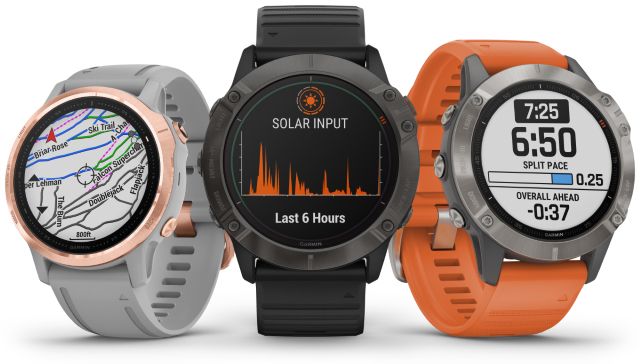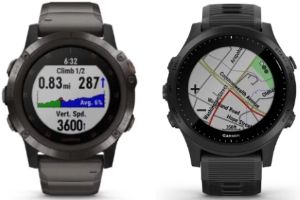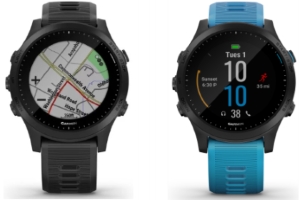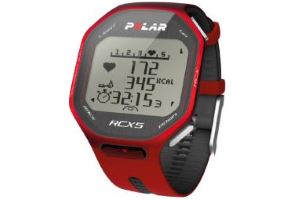- A new series that will (again) be a hit! The first Garmin watch with solar charging
- Features of the Fenix 6
- Fast presentation of the Fenix 6 and its new features
- Detailed overview of the Fenix 6 and its new features
- Comparison Fenix 6 versus Fenix 6 Pro & Sapphire versus Fenix 6X Solar: the differences
- Our opinion on the Fenix 6: should you buy it?
- Price and availability
A new series that will (again) be a hit! The first Garmin watch with solar charging
It was long awaited and rumours were running high about it: Garmin announced on August 29, at the UTMB (Ultra-Trail du Mont-Blanc), its new Fenix 6 series, replacing the series Fenix 5 Plus. It is available in 9 versions, including one with solar charging, a first for Garmin.
You will find below the new features of this model compared to the Fenix 5 Plus, a detailed review of its features and functions, the differences between the 9 models of Fenix 6 and our opinion on this series.
Buy Fenix 6
Features of the Fenix 6
Fenix 6S : 58 to 61 g
Fenix 6 : 80 to 83 g (steel), 72 g (titanium)
Fenix 6X : 93 g (steel)
Fenix 6X Pro Solar : 82 g (titanium)
Dimensions
Fenix 6S : 42 x 42 x 13.8 mm
Fenix 6 : 47 x 47 x 14.7 mm
Fenix 6X : 51 x 51 x 14.9 mm
Screen
Fenix 6S : 240 x 240 px
Fenix 6 : 260 x 260 px
Fenix 6X : 280 x 280 px
Autonomy (watch/GPS)
9 to 24 d / 25 to 148 h (see comparison below)
GPS
GPS, GLONASS, Galileo
Multisports
Yes (triathlon, etc.)
Recommended activities
Triathlon, running, trail, ultra, ski, alpinism, trekking, hiking, outdoor, golf and more. Many profiles.
Connectivity
Bluetooth Smart wireless data transfer.
Cardio-frequency meter
Yes, optical at the wrist, measures HR underwater
Optional (roads, bike paths, ski trails)
Music player
Option, 2000 songs
Payment system
Yes
Telephony / 4G
-
Barometric altimeter
Yes
Barometer
Yes
Compass
Yes
Thermometer
Yes
Meteo
Yes. Weather trend, storm alerts, barometer
Waterproof
10 ATM (100 m)
Other
Oximeter (assesses altitude & heat acclimatization), Body Battery, adaptive programs, running dynamics, physiological measurements (VO2max, stress, training load, etc.), ClimbPro, PacePro, path generator, Trendline
Fast presentation of the Fenix 6 and its new features
The Garmin Fenix 6 in brief: an ultra-complete model designed for all sports
Announced on August 29, 2019 at the UTMB, the Fenix 6 series is Garmin's latest series of high-end multi-sport watches, the most complete on the market to date (2019). It replaces the series Fenix 5 Plus (2018) and Fenix 5 (2017). Every year, Garmin adds new features to its watches, both in terms of functions and on-board sensors. The design and quality of the screen are also improved.
Garmin offers here a watch in 3 models (standard, Pro and Solar), 3 case sizes and 2 types of glass (Corning Gorilla Glass or sapphire). The watch features new sensors, a larger and better-defined display and offers almost twice the autonomy of the previous model. Some new features are emerging, in particular a solar model that extends the autonomy from 6 to 50%. We list these new features below and detail them below.
3 versions (Standard, Pro and Solar) and 9 models for the Fenix 6 series!
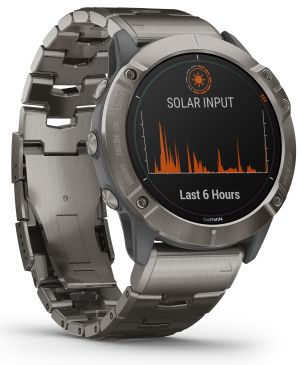
The Fenix 6 series has 9 models (compared to 5 for the Fenix 5 Plus) and we could quickly get lost. In reality, things are quite simple. Mapping and mp3 player are not very useful functions for most high performance athletes, athletes, triathletes and competitors. They unnecessarily inflate the price of an already very expensive watch. With the Fenix 6 series, Garmin now offers an "à la carte" watch with these optional functions, just like the watch crystal (Corning Gorilla or sapphire). Enough to satisfy almost all budgets (the price starts at 599 € and can go up to 1100 € for the Solar model with titanium bracelet).
There are 3 sizes of cases (as on the Fenix 5 Plus): the 6S version (42 mm diameter) for thin wrists, the 6 (47 mm) version for standard wrists and the 6X (51 mm) version for wide wrists. Nothing new here except the screen and its definition are evolving for the 6 and 6X versions of the watch.
Garmin also offers its watch in 3 versions (new):
- Fenix 6S and 6: without mapping, without mp3 player, without Wi-Fi, with Corning Gorilla Glass 3 ultra scratch-resistant glass.
- Fenix 6S Pro, 6 Pro and 6X Pro with mapping, mp3 player, Wi-Fi for 100 € more (or 150 € for the 6X Pro version) and a glass to choose between Corning Gorilla and sapphire (another 100 € more or 200 € for the 6X Pro version). Sapphire is resistant to impact and scratches.
- Fenix 6X Pro Solar: with mapping, mp3 player and Wi-Fi (like the Pro version) but with additional solar charging (Power Glass made of Corning Gorilla and integrated photovoltaic cells)
Note that the standard version (without maps and mp3 player) is only available in 2 housing sizes (Fenix 6S and Fenix 6). There is no Fenix 6X. People with wide wrists will therefore necessarily have to pay a high price and buy the Pro or Solar version with mapping and music player even if they do not need these functions.
You will find below in this article the difference between these 9 models of Fenix 6.
The new features of the Fenix 6 compared to the Fenix 5
For this new version, Garmin offers a number of new features that we list below, but no major changes except a solar version of the watch (first at Garmin). It carries voltaic cells that extend the watch's autonomy by 6 to 50% depending on its use. Garmin still offers 3 sizes of cases (6S, 6 and 6X versions) to satisfy the greatest number of people (thin, standard and wide wrists). The American company is also improving the design of its watch (more robust and compliant with the American STG-MIL-810 standard, thinner and also more elegant) and adding new bracelets, materials and colours. The screen size and resolution increase on models 6 and 6X with a gain of 19 to 36% and a resolution that increases from 240 x 240 px to 260 x 260 px and 280 x 280 px respectively on models 6 and 6X.
The battery life is also improved and the watch has intelligent battery management, much like on the Suunto 9. With these new models, it will be difficult to run out of battery power, even in ultra-long races like the UTMB, provided you opt for the Fenix's wide (6X) model!
A new PacePro function is introduced to manage its course according to the slopes. This function will be integrated with Forerunner 245 and Forerunner 945.
The Fenix 6 also inherits the latest models (Forerunner 945 and MARQ series): underwater optical monitor, pulse oximeter and acclimatization to altitude and heat assessment, Body Battery functions (evaluation of available resources), course generator, ClimbPro function (altimeter profile analysis and sports assistance), live route recalculation.
Finally, as explained above, Garmin takes into account the fact that not all athletes are interested in the mp3 player and mapping and now offers cheaper models without these features. The basic model is offered at €599, which is €100 less than the Fenix 5 Plus.
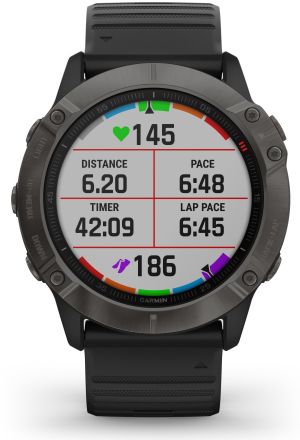
The main new features of the Fenix 6 compared to the Fenix 5 Plus are as follows:
- A more robust design (metal case back), thinner and more chic with more strap colours and woven nylon bracelets as on the MARQ series (in addition to leather, stainless steel, titanium and silicone bracelets)
- A new underwater optical heart rate monitor on the wrist (3rd generation) (already available on the Forerunner 945, Forerunner 245 and luxury series MARQ)
- A pulse oximeter (pulse OX) generalized to all models for the evaluation of altitude acclimatization and a more complete sleep monitoring (already present on the Fenix 5X and Forerunner 245 and 945)
- A new, energy-efficient Sony GPS chip (already available on the Forerunner 45, 245 and 945 series and the MARQ series)
- Larger screen and better screen resolution on the Fenix 6, Fenix 6 Pro, Fenix 6X Pro and Fenix 6X Pro Solar models. The 3 watches (6S, 6 and 6X) thus offer a screen of 1.2", 1.3" and 1.4" for a resolution of 240 x 240 px, 260 x 260 px and 280 x 280 px respectively.
- A significantly improved battery life (almost twice as long as the Fenix 5 Plus in GPS training mode) and intelligent battery management to disable certain functions and change modes during operation. The display of the remaining time of autonomy (instead of the %).
- Charging the battery with solar energy on the Fenix 6X Pro Solar
- A memory that increases from 16 to 32 GB for models with mp3 players (2000 songs available instead of 1000).
- Color mapping (Pro and Pro Solar models only) now includes ski slopes at more than 2000 resorts worldwide (these layers will be integrated with the Forerunner 945 and MARQ series)
- A new PacePro function to help runners better manage their pace according to the altitude profile
- New functions for golf (in addition to the already very complete functions and more than 40,000 on-board courses)
- Voice guidance (with Bluetooth headsets) along a programmed route
- More data fields per screen (6 to 8 depending on the model)
- The integration of the latest innovations of the Forerunner series: Body Battery, stress assessment, training charge objective, main benefit, etc.
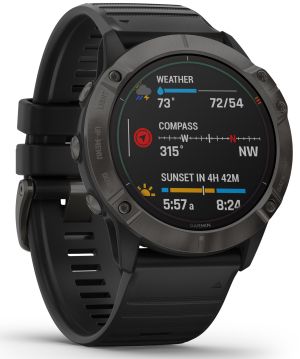
The Fenix 6 obviously includes all the basic features and functions of the Fenix 5 Plus (except for the mp3 player, mapping and Wi-Fi now available as an option). All the useful sensors (barometric altimeter, barometer, compass, gyroscope, thermometer, accelerometer, cardio-frequency meter on the wrist, GPS, GLONASS and Galileo), multisport functions, intelligent connectivity and advanced navigation functions (geolocation, programmed course tracking, tracking of other athletes, trackback, etc.) are available. ) and training (running dynamics, physiological measurements, performance analysis, split training, segments, Virtual Partner to measure yourself or others, training objectives and status, etc.).
It is a true "multi-sport" in the sense that it records sequential activities and displays data for each sport during the race without having to stop recording between activities. It is therefore suitable for triathlon, swimrun, etc.
The Fenix 6's advanced functions provide a wide range of information on its fitness level (fitness test, fitness age, VO2max, stress, lactic threshold, recovery time, FTP, race time forecast, training load, etc.). It offers connected functions (Smartphone/SMS/social network notifications, control of objects such as the VIRB camera or a Shimano Di2 derailleur.
The watch is robust and beautiful in design and materials: steel or titanium bezel, silicone strap, leather, stainless steel, stainless steel, braided nylon or titanium to suit the activity and outfit (casual, city, sport).
Fenix 6 series : for whom ?
The Fenix 6 is a multi-sport watch designed for almost all sports, whether for leisure, training, competition or professional use. Its instruments allow a mixed use (sea, land, mountain). It is particularly well suited to trail and ultra-trail, triathlon, cycling, skiing, hiking (onboard passes, cycle paths and ski slopes) and golf (full functions and onboard courses). It can also be worn in the city, at work or for an evening thanks to its neat design (metal bezel, elegant bracelets in leather, nylon, titanium and steel, various colours).
You hesitate to buy this watch? Read our notice about the Garmin Fenix 6 at the end of the article.
Detailed overview of the Fenix 6 and its new features
The Fenix 6 incorporates all the functions offered by the Fenix 5 Plus (read our detailed review) and includes the latest features of the recent Garmin watches (Forerunner 945 in particular) in addition to the new features mentioned above that we detail here.
Design and weight: elegant, robust and thinner than the Fenix 5 Plus
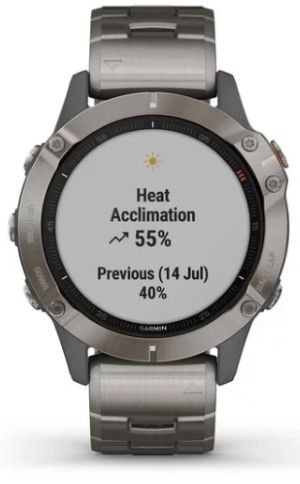
The Fenix 5 Plus was elegant, the Fenix 6 even more so. The chic of the watch is also what makes the difference with the Forerunner 945 (same functions but lighter and with a more sporty look). Garmin has worked on this aspect to make his watch similar to a luxury watch that can be worn without blushing on a daily basis, at work, in the city or during a formal evening, but also 24 hours a day for health monitoring. The watch is more robust (it now meets the American STG-MIL-810 standard), slightly thinner and looks good. Garmin offers a new nylon strap (like the Captain luxury watch from the MARQ series) and more colours for its bracelets.
The screen: larger and better resolution on versions 6 and 6X
The Fenix 5 Plus offered 3 body sizes but a single screen size (1.2") and a single definition (240 x 240 px). The Fenix 6 retains the same body sizes as the Fenix 5 Plus but offers a larger screen and a higher resolution for models 6 and 6X. This increases the diameter of the Fenix 6 to 1.3" and the diameter of the Fenix 6X to 1.4", representing an area gain of 18% and 36% respectively. The definition increases to 260 x 260 px for the Fenix 6 and 280 x 280 px for the Fenix 6X. We are still far from the Suunto 9 and its 320 x 300 px screen but the gain is already appreciable.
The number of fields per screen is also increased: from 4 to 6 maximum fields on the Fenix 6S and 6 and to 8 maximum fields on the Fenix 6X. It is therefore possible to display more data per screen to see everything in one block rather than having to page the screens during the activity.
Autonomy: almost doubled, a new intelligent battery management mode and solar charging for the Solar version
Garmin offers a watch with record battery life and great flexibility in battery management to best adapt its use to the needs of its user.
The Fenix 6 inherits the new Sony GPS chip (like the Forerunner 945), which is more energy efficient than the Mediatek chip. This allows a substantial gain in autonomy: it is almost twice as long as the Fenix 5 Plus! This means 60 hours on the Fenix 6X in GPS mode and up to 120 hours in UltraTrac mode!
The Solar version also offers a solar charger thanks to transparent photovoltaic cells integrated in the watch glass. Even if solar energy alone is not enough to fully charge the watch or to extend its autonomy indefinitely, it would, depending on the use, allow between 6 and 50% more autonomy, provided of course that the Fenix is exposed to the sun long enough. The watch displays the strength of the received signal (see photo opposite) to indicate the actual charging times. You can use your Fenix 6X Pro for up to 21 + 3 days in connected watch mode, 60 + 6 hours in GPS mode or 15 + 1 hour in GPS + music mode. Garmin reports these figures based on exposure to full sunlight at 50,000 lux during the activity or for at least 3 hours if the watch is used connected.
For even more autonomy, a "maximum battery" mode (equivalent to the UltraTrac) doubles the autonomy. And for even more autonomy, a "Shipping" mode and a "Battery saving" mode allow you to last several weeks by recording GPS coordinates only once an hour (adjustable parameter) and by disabling some sensors.
Like Suunto and its Suunto 9 or Suunto 5, Garmin adds an intelligent battery management system, the Power Manager. This function displays the consumption of the main sensors and allows them to be deactivated individually. It is also possible to define a custom battery management mode.
| Mode | Fenix 6S & 6S Pro | Fenix 6 & 6 Pro | Fenix 6X Pro | Fenix 6X Pro Solar |
|---|---|---|---|---|
| Connected watch | 9 d | 14 d | 21 d | 21 + 3 d* |
| GPS | 25 h | 36 h | 60 h | 60 + 6 h** |
| UltraTrac GPS | 50 h | 72 h | 120 h | 120 + 28 h** |
| GPS + Music | 6 h | 10 h | 15 h | 15 + 1 h** |
| Exploration mode | 20 d | 28 d | 46 d | 46 + 10 d** |
| Battery saving | 34 d | 48 d | 80 d | 80 + 10 d** |
** For use in full sunlight (50,000 lux)
A new cardio optic that works underwater
The Fenix 6 features a third generation optical heart rate monitor on the wrist that works underwater (as on the latest Polar watches) thanks to a new LED system. This sensor is not new since it is already used in the Forerunner series (245, 945) and the MARQ series.
The pulse oximeter generalized to all models
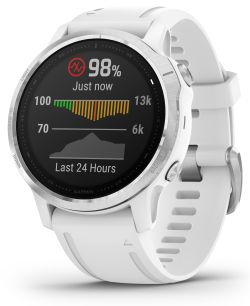
Each Fenix 6 is also equipped with a pulse oximeter (saturometer) and the pulse function Ox. Only the Fenix 5X Plus benefited from it. The oximeter measures the blood oxygen level. It gives an indication of the body's acclimatization to altitude and heat and is used in assessing sleep quality. It is also used to alert the athlete in case of insufficient oxygenation during diving or mountaineering outings.
For this purpose, the watch displays a percentage of oxygen and a graph representing the average of the readings for the last 24 hours based on the altitude curve. The oxygen level should theoretically remain at values above 95%. Below 95%, lack of oxygen (hypoxia) must be taken into account.
The test is performed using a sensor that emits red light and infrared light, as in medical oximeters. Hemoglobin captures oxygen from the lungs and then redistributes it, thus discharging its oxygen along its path. The measurement at the extremities (hands) is used to check whether the oxygen level is sufficient. The more oxygen the hemoglobin is charged with, the more it absorbs infrared light. The lower the oxygen content, the more red it absorbs and allows infrared light to pass through. The watch exploits this property.
It should be noted that the measurement is delicate. To be done in good conditions, the athlete must be inactive or sitting during the measurement and the sensor in perfect condition. Incorrect positioning of the sensor, a scratched sensor, movement or certain pathologies (low blood pressure, heart rhythm disorder, anemia) can distort the measurements.
Mapping: ski slopes now integrated into topographic maps
The colour mapping of the country or continent of purchase (Europe for a purchase in France) and the cycle maps (Garmin Cycle maps) that were systematically offered on the Fenix 5 Plus are now only available on the Pro version of the Fenix 6 (Fenix 6S Pro, Fenix 6 Pro, Fenix 6X Pro and Fenix 6X Pro Solar). Garmin adds the ski slopes of more than 2000 resorts around the world. Tracks are displayed in color, according to their difficulty, with their name. The watch also includes dedicated functions such as counting the number of descents performed.
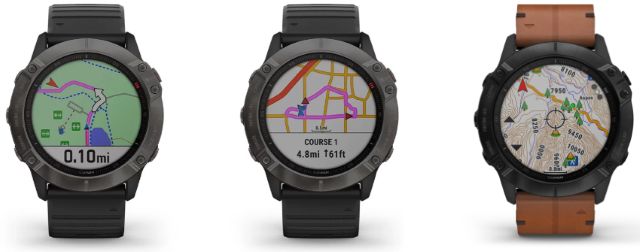
GPS navigation: voice guidance in addition
GPS navigation is complemented by voice guidance. It allows you to be steered without looking at the watch, simply by wearing Bluetooth headsets and being guided by the voice instructions issued by the Fenix.
The optional mp3 player and double the memory capacity
The mp3 player is now available as an option, as is mapping. The watch can store 2000 musical tracks (compared to 1000 on the Fenix 5 Plus) thanks to a gigantic 32GB memory, a large part of which is used for maps. The watch allows (paid) access to the main online download platforms (Deezer, Spotify).
A new PacePro function for runners
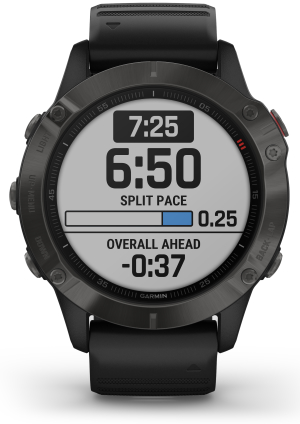
The PaceProfeature or PacePro function evaluates the difficulty of the terrain (slope profile) and takes into account the physical condition to assist the runner in his exit. For example, it suggests accelerating or decelerating according to the slope. It also displays information useful to the athlete such as the pace of the race to be achieved or the distance remaining in the segment.
More golf features
New golf features complement the already comprehensive features of the Fenix 5 Plus:
- A "PinPointer" function that assists the golfer when he can't see the green (for example if he is in the forest)
- A "PlayLike" function that takes into account the slope of the terrain to calculate and display the exact distance to the green
- Displaying the score by disability
The integration of the latest innovations already offered on the latest Garmin watches
The Fenix 6 also includes all the new features of the latest Garmin watches (notably Forerunner 945):
- Body Battery Energy Monitor (evaluates recovery and energy expenditure throughout the day as well as recovery during sleep)
- Assessment of acclimatization to heat and altitude and adjustment of VO2max according to altitude and heat
- Incident detection and assistance in the event of an incident
- The definition of a training load objective
- Training Effect labels (main benefit)
- Breathing frequency measurement
- Management of indoor running
- Advanced Vector support
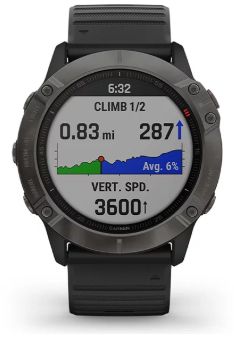
The basic functions, already present on the Fenix 5 Plus
Of course, we find the functions already present on the Fenix 5 Plus, in particular:
- The round-trip route generator (Pro version only)
- The popular route generator (Trendline)
- ClimbPro for slope profile analysis and assistance to cyclists and runners in their ascent
- Pulse oximeter and blood oxygenation monitoring (SpO2)
These functions are a definite asset for cyclists and runners but also for high mountain enthusiasts (oxygenation monitoring).
For a description of these features, see our detailed review of the Fenix 5 Plus.
Comparison Fenix 6 versus Fenix 6 Pro & Sapphire versus Fenix 6X Solar: the differences
The Fenix 6 series comes in 3 housing sizes (6S / 6 / 6 / 6X) and offers optional mapping and mp3 player (Pro and Pro Solar models only). The Solar version extends the battery life by using photovoltaic cells integrated into the watch crystal. Note that the 6X version, for wide wrists, only exists in Pro and Solar versions and that the Solar version is only available in one housing size (the largest).
Here is a comparison between these models to help you make your choice. We propose below a summary table.
Comparison of the basic versions: Fenix 6 versus Fenix 6S
These 2 models have no mapping, no mp3 player, no Wi-Fi (used for data transfer to the Garmin Connect application and music transfer). If you are using a PC, you will need to use the cable provided with the watch to transfer the data). The difference between the 2 watches is in the size of the case (42 versus 47 mm) and the screen (1.2" versus 1.3"), the definition of the screen (240 x 240 px versus 260 x 260 px), the weight of the watch (58 g versus 80 g), the autonomy, the size of the bracelets (20 mm versus 22 mm) and the colors of the watch and the bracelets.
The 6S model is designed for small wrists and does not offer a titanium strap. The 6X model, for wide wrists, does not exist in this basic version.
These models, the cheapest in the range, are perfect for runners, trailers, triathletes who do not need a music player and mapping to practice their sport.
Discover all the details in our comparative table below.
Comparison of Pro & Sapphire versions: Fenix 6S Pro versus Fenix 6 Pro versus Fenix 6X Pro
These models include an mp3 player and colour mapping (including bike paths and ski slopes). The difference between the 3 versions is in the size of the case (42, 47 and 51 mm to fit all wrist sizes) but also in the screen (size and definition), the width of the bracelets (20, 22 and 24 mm), the weight of the watch and the autonomy. In terms of functions, they are identical.
For these models, you can choose between a scratch-resistant Corning Gorilla Glass and, for an additional €100 (€200 for the 6X Pro version), a sapphire crystal (ultra-resistant to impact and scratches).
The Pro series is perfect for athletes who like to listen to music during their sport without having to carry a smartphone, for hikers, cyclists and trailers who like to get off the beaten track and need maps to find their way around or who want the watch to offer them a tailor-made itinerary (itinerary generator based on a distance and direction, popular itinerary generator). Skiers will also enjoy the ski resort map to find a trail easily.
See the comparative table below.
Fenix 6 Pro versus Fenix 6X Pro Solar
The Solar version of the Fenix 6 is available in only one housing size, the one designed for wide wrists. It offers a solar battery charger that helps to extend the watch's autonomy but does not fully charge it. The glass of the Solar is Corning Gorilla Glass (sapphire glass is not available). The bezel and case back are made of titanium (lighter). Its weight is therefore slightly lower than that of the Fenix 6X Pro (82 g versus 93 g).
The Fenix 6X Pro Solar is suitable for explorers and adventurers or even ultra-trailers who are looking for a record autonomy (provided there is sunshine and the watch is well exposed!) in a relatively light watch. However, it is only available in one size and can therefore look a little mastodontic on a thin wrist.
See the comparative table below.
6S versus 6 versus 6 versus 6X
Garmin offers 3 case sizes for its watches to fit all wrist sizes (thin wrists, female wrists, standard wrists, wide wrists). The differences between these 3 models are also in the straps (no titanium for the 6S model!), the width of the strap but also the size of the screen, its definition, the weight of the watch, its autonomy and, for the 6X model, its higher price!
People with thin wrists will prefer the 6S model but, in return, will not benefit from the more comfortable screen and the record autonomy of the larger models. You can of course choose a larger model but the look will be less pretty and the fit a little less comfortable.
Unlike the Fenix 5 and Fenix 5 Plus series, the wide model (6X) does not have any additional features but remains more expensive than the other models! However, it has the best autonomy and the widest and most accurate screen. You will have to pay 50 to 150 € more to get it depending on whether you choose a Corning Gorilla or sapphire glass.
| Features and characteristics | Fenix 6S | Fenix 6 | Fenix 6X |
|---|---|---|---|
| Size | Thin wrists | Standard wrists | Large wrists |
| Housing size (mm) | 42 | 47 | 51 |
| Thickness (mm) | 13.8 | 14.7 | 14.9 |
| Screen size (mm) | 30.4 | 33.02 | 35.56 |
| Screen definition (px) | 240 x 240 | 260 x 260 | 280 x 280 |
| Weight | 58 to 61 g | 72 to 83 g | 82 to 93 g |
| Wristband thickness (mm) | 20 | 22 | 24 |
| Bracelet material | Silicone, suede, steel, nylon | Silicone, leather, steel, titanium, nylon | Silicone, leather, steel, titanium, nylon |
| Wristband length (min and max) | 108 to 189 mm | 125 to 215 mm | 127 to 225 mm |
| Interchangeable bracelet | • | • | • |
| Watch autonomy | 9 d | 14 d | 21 d (+solar) |
| GPS autonomy | 25 h | 36 h | 60 h (+solar) |
| Lightweight | +++ | ++ | + |
| Display comfort | ++ | +++ | ++++ |
| Autonomy | ++ | +++ | ++++ |
| Advantages | Suitable for thin wrists | Good autonomy and screen size | Comfortable display, record autonomy |
| Disadvantages | Slightly short battery life, less comfortable display than the other models, no titanium strap | A little heavy, too big for small wrists |
Comparison of Fenix 6 models
| 6S | 6 | 6S Pro | 6 Pro | 6X Pro | 6S Pro Sapphire | 6 Pro Sapphire | 6X Pro Sapphire | 6X Pro Solar | |
|---|---|---|---|---|---|---|---|---|---|
| Prix (€) | 599,99 | 599,99 | 699,99 | 699,99 | 749,99 | 799,99 | 799,99 | 949,99 | 949,99 |
| mp3 player | • | • | • | • | • | • | • | ||
| Cartography | • | • | • | • | • | • | • | ||
| Wi-Fi | • | • | • | • | • | • | • | ||
| Bezel size | 42 mm | 47 mm | 42 mm | 47 mm | 51 mm | 42 mm | 47 mm | 51 mm | 51 mm |
| Thickness | 13.8 mm | 14.7 mm | 13.8 mm | 14.7 mm | 14.9 mm | 13.8 mm | 14.7 mm | 14.9 mm | 14.9 mm |
| Weight | 58 g | 80 g | 61 g | 83 g | 93 g | 61 g | 83 g | 93 g | 82 g |
| Screen size (mm) | 30.4 mm | 33.02 mm | 30.4 mm | 33.02 mm | 35.56 mm | 30.4 mm | 33.02 mm | 35.56 mm | 35.56 mm |
| Screen size (inches) | 1,2" | 1,3" | 1,2" | 1,3" | 1,4" | 1,2" | 1,3" | 1,4" | 1,4" |
| Screen definition (px) | 240x240 | 260x260 | 240x240 | 260x260 | 280x280 | 240x240 | 260x260 | 280x280 | 280x280 |
| Autonomy (watch) | 9 d | 14 d | 9 d | 14 d | 21 d | 9 d | 14 d | 21 d | 21+3d* |
| Autonomy (GPS) | 25 h | 36 h | 25 h | 36 h | 60 h | 25 h | 36 h | 60 h | 60+6h* |
| Autonomy (UltraTrac) | 50 h | 72 h | 50 h | 72 h | 120 h | 50 h | 72 h | 120 h | 120+28h* |
| Autonomy (GPS+Music) | 6 h | 10 h | 6 h | 10 h | 15 h | 6 h | 10 h | 15 h | 15+1h* |
| Autonomy (Exploration) | 20 d | 28 d | 20 d | 28 d | 46 d | 20 d | 28 d | 46 d | 46+10d* |
| Autonomy (Eco) | 34 d | 48 d | 34 d | 48 d | 80 d | 34 d | 48 d | 80 d | 80+10d* |
| Memory | 64 MB | 64 MB | 32 GB | 32 GB | 32 GB | 32 GB | 32 GB | 32 GB | 32 GB |
** For use in full sunlight (50,000 lux)
Criteria to help you choose between Fenix 6, Fenix 6 Pro and Fenix 6X Pro Solar
| Fenix 6S/6 | Fenix 6S/6/6X Pro | Fenix 6X Pro Solar | |
|---|---|---|---|
| Main differences | The most economical model, without maps, without mp3 player, without Wi-Fi available in 2 case sizes (thin + wrists standard) | The complete model with maps + music + Wi-Fi. A large model with a high autonomy (6X). Sapphire crystal or Corning Gorilla of your choice. | With solar recharge to extend the battery. No sapphire glass. One size only (large) |
| Advantages | More affordable price | Maps, music and Wi-Fi in addition | Solar recharge |
| Disadvantages | No Wi-Fi (transfers to PC) | High price | Only one case size, no sapphire crystal, high price |
| Mapping (road, cycling, skiing) | • | • | |
| mp3 player | • | • | |
| Wi-Fi | • | • | |
| Sports | Trail, running, triathlon, competition, pro training | Trail, running, triathlon, competition, pro training + Cycling, hiking, skiing, outdoor, exploration, sea navigation | All uses |
| Navigation | •• | •••••• | •••••• |
| Prices | $$$ | $$$$ | $$$$ |
Our opinion on the Fenix 6: should you buy it?
Garmin has accustomed us to releasing a new Fenix model every year and each new model brings new surprises, whether in terms of functions, sensors or autonomy. The price is also adjusted and tends to increase with the versions.
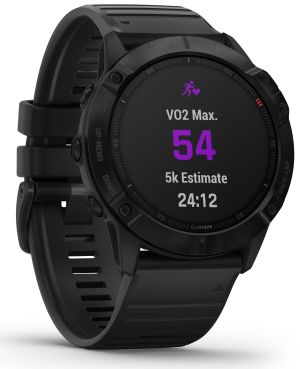
By 2018, we had been blown away by the Fenix 5 Plus (read our review and our more general description) which was not just an improvement of the Fenix 5 but a much more complete model with many new and relevant features. One could therefore wonder what more the new Fenix would bring.
The Fenix 6 does not offer any major changes except for the release of a solar hardbanding model (first at Garmin). It incorporates the characteristics of the Fenix 5 Plus, adds the new features of the latest watches released (MARQ series in part and Forerunner 945 among others), adds some new features (including the PacePro function which will be installed on the Forerunner) but above all important changes in technical characteristics: screen size and definition, autonomy (almost doubled), battery management, strap colour palette. In short, Garmin has worked on some weaknesses to align itself with the competition and gain market share. In order to lower the price of the basic model and make it more accessible, mapping and mp3 player are now available as an option. Not all athletes are interested in these functions.
If you look closer, the Pro model looks a lot like the Fenix 5 Plus except for a larger screen, almost doubled battery life, intelligent battery management and an identical price with the more robust Corning Gorilla glass or a price of 50 € cheaper for the version with sapphire glass.
As for the Solar version, it allows you to gain a few hours of autonomy at most as long as you expose it to the sun. The gain is not huge and rather random. It is difficult to leave serene during a long race if you know that the autonomy will be just enough.
What is the interest of this new model?
The Fenix 6 does not offer many new features: a few more features for golf, a PacePro function that will be added to the Forerunner anyway, voice guidance when following a defined route, a Solar version providing a random gain in autonomy.
It is mainly in the comfort of the screen that we gain (except for the small model (6S)), the number of fields displayed per screen, but also the autonomy which doubles. The 6X model is more expensive than the other 2 formats for identical functions. Intelligent battery management is also an advantage for this watch: it allows you to change modes or activate and deactivate certain sensors individually and define custom profiles. The maps of the ski resorts are being enhanced with maps of the ski resorts, which should appeal to skiers (these maps will also be added to the Forerunner 945 and MARQ series maps). The memory capacity doubles and allows you to store more songs. We are also dealing with a more elegant and a little thinner watch, which will therefore be easier to wear outside of sport.
All these improvements should attract more buyers: skiers, ultra-trailers looking for a watch with a long autonomy (an alternative to the Suunto 9, which was until now the best on this field), sportsmen and women who want a more comfortable screen (we are getting closer to the Suunto 9), sportswomen and non-sportswomen looking for a complete and chic watch to wear 24 hours a day (the improved design allows it).
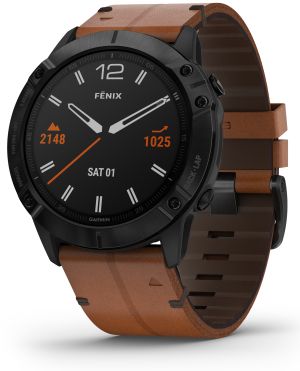
Why it should be a hit?
We wrote above that the Fenix 6 should be a hit. The Fenix is to date the most complete sports watch on the market. It is multi-sport, includes all the useful sensors (all it needs is a touch screen, power measurement on the wrist, such as the Polar Vantage V and a 4G chip as on the Apple Watch, offers ultra-complete functions for athletes (performance analysis, physiological measurements, race dynamics, etc.) in addition to including colour topographic maps, music, a payment solution and remarkable tools to orient yourself, generate a route, be guided and supported in your activity.
The previous models have already been very successful. This new series will not escape the rule, especially since, as explained above, the improvements made should attract even more buyers. Ultra-trailers who opted for the Suunto 9 for its record autonomy and intelligent battery management or screen size will now find these features in the Fenix 6. Skiers who enjoyed the Casio Pro Trek will find it better in the new Fenix, which now takes on the ski slopes, counts the runs and provides orientation when off-piste or cross-country skiing. People who found the Fenix 5 Plus too expensive will find a more affordable basic model.
Do I have to resell my Fenix 5 Plus for a Fenix 6?
If you have just purchased a Fenix 5 Plus just before the release of the Fenix 6, it may not really be a problem. You could have paid less for the basic version (without maps and mp3 player) and could benefit from a larger screen (except 6S model) and a better autonomy. If you are already satisfied with the visual comfort of your Fenix 5 Plus and the autonomy, there is no reason to change the model.
It is especially for skiers (and still) and sportsmen looking for a watch with a long autonomy that the new features of the Fenix 6 are interesting. The Fenix 6 is more outdoor and ultra-trail oriented than the previous model. It is also more elegant. If the switch from the Fenix 5 to the Fenix 5 Plus was significant and could justify buying the new model, the switch from the Fenix 5 Plus to the Fenix 6 is much less interesting. The Solar version is also not a great revolution (we will not be able to charge the watch but only gain a little autonomy).
The Fenix 5 Plus should now see its price drop and therefore represents a good buying opportunity for people who want to acquire an excellent sports watch with cartography and music at a reasonable price.
Fenix 6 or Forerunner 945?
The choice between the Fenix 6 and the Forerunner 945 depends on the use you want to make of the watch. Although it can be worn 24 hours a day, the Forerunner 945 is a watch designed mainly for sporting use and especially for triathlon (it is now the only Garmin watch designed for this purpose, the Forerunner 735XT not being renewed). It is made of plastic, ultra-light and comfortable to wear, making it ideal for sports but less attractive to wear outside of sports. In comparison, the Fenix 6, which is more chic and heavier, is a little less suitable for top-level sports and competition.
If you are looking for a watch to wear only during sport and are looking for performance in activities such as running, trail, triathlon, cycling, it is better to choose the Forerunner 945. For daily use (activity monitoring), outdoor use (spotting, navigation, exploration) and the pleasure of wearing a pretty watch, opt for the Fenix 6.
We will soon propose a comparison between these 2 models.
- Rich functionalities (analysis tools, physiological measurements, assistance...)
- Complete with sensors (baro altimeter, compass, thermometer...)
- Record battery life and intelligent battery management
- Even more complete mapping (ski slopes) and optional mp3 player
- Contactless payment
- Elegance and diversity of bracelets and materials
- A touch screen, especially with topographic maps
- A more affordable price (few new products but a price that is still rising)
Price and availability
The Garmin Fenix 6 has been available for sale since September 2019 but on pre-order for some models (think about ordering quickly to have the best chance of receiving your watch quickly). The recommended price for the basic model is €599.99, which is €100 less than the Fenix 5 Plus but without the cartography and mp3 player. The Pro model is available from €699.99 and the 6X Pro Solar model from €949.99. For a sapphire crystal, add 100 € (200 € for the 6X model). Discover the Fenix 6 at our partners and enjoy our coupons.
Buy Fenix 6
These articles may also interest you
Comparaison Garmin Forerunner 945 vs Fenix 5 Plus : les différences, laquelle choisir ?
Garmin Forerunner 945 : la montre triathlon avec musique et cartographie
Les meilleures montres cardio 2026 pour femmes
Meilleures montres GPS altimètre 2026pour la randonnée
Meilleures montres GPS 2026 pour le triathlon
Photo credit : Fotolia.com. This article contains commercial links.

